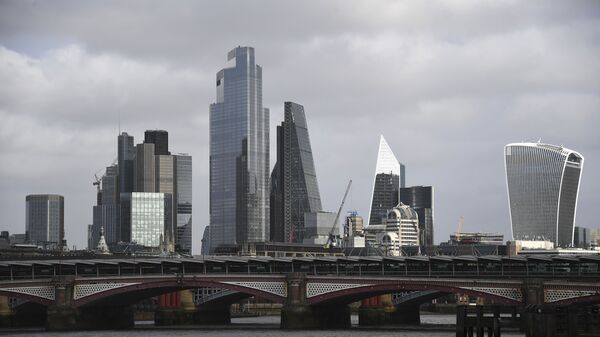Brussels cannot afford to lock out UK finance firms even after a no-deal Brexit - because the euro currency is a "massive Ponzi scheme."
The Express quoted a former Brexit minister and two City of London figures who said the European Union (EU) needed needed UK financiers to manage the risk on government debts in the eurozone to keep the currency afloat.
That was after the powerful EU Commission backed down earlier this week on its threats to stop UK financial clearing houses processing international payments from companies in the 27 EU members states, extending the City's access to the lucrative market for another two years.
"This is because they cannot raise the capital themselves and they need the City of London," stressed former Brexit minister and Conservative MP David Jones. "The problem they have is that the euro is a massive Ponzi scheme and they have no real means of underpinning it."
Barney Reynolds, a partner at Shearman & Sterling LLP, said the role of the City of London in mitigating the risks of debt in the eurozone should not be underestimated.
“EU law treats the debt that finances the eurozone – eurozone member state debt – as risk free," Reynolds pointed out. "However, in fact it is highly risky since none of these countries controls the central bank issuing the euro currency.
“The result is there is a vast amount of unmanaged risk swishing around the EU financial system. Right now the UK mitigates that risk in London, which is where the EU financial system meets the global markets.”
Negotiations between Westminster and Brussels have been deadlocked for months over the EU's demand for continued access to British fishing waters and imposition of its rules against state aid to industry.
With the October 15 deadline for a deal looming, Prime Minister Boris Johnson's government is pushing legislation though Parliament to ensure Northern Ireland will remain within the UK's internal market. Government figures have admitted Internal Market Bill will breach the EU Withdrawal Agreement in "limited" ways, prompting a short-lived rebellion by Conservative MPs.
Former British Chambers of Commerce director-general John Longworth, now the chair of the pro-Brexit Foundation for Independence, accused the EU of “running a racket” on the euro. He said the financial weakness of poorer EU members kept the exchange rate artificially low, benefitting exports from Germany, the bloc's biggest economy.
“What the UK should do is say to the EU: ‘If you don’t play ball we’re going to actually lift this veil and expose the fact that the eurozone is a bust system built on nothing and the European banking system/corporate debt system/government debt system will be in serious trouble,” he said.
A no-deal Brexit and the new legislation could spark a trade war between the UK and EU with "punitive tariffs erected, sanctions, and fisticuffs in the Channel," Longworth acknowledged.
But he argued: "The UK response to that should be: If you go down that route [your] economy will be completely bust because we’ll withdraw the underpinning that the City of London provides.”



